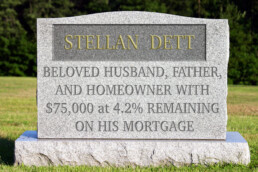Unexpected Homebuying Roadblocks
Your offer has been accepted on your dream home and you have a down payment, good credit, and little debt. So the escrow process should be a breeze, right? WRONG! There are some surprising deal breakers that can quickly cause the transaction to go south. Here are a few of the most common ones.
Closing Lines of Credit
Maybe you’ve realized you have a few more credit cards than you’d like your lender to see. Time to shut ’em down before they check your credit, right? Not so fast. Closing down multiple accounts could actually ding your credit. Credit is composed of a few key components, the age of an opened account being one biggie. Shutting down multiple accounts will also lower your credit utilization rates, which can be yet another credit killer. Research the impact of any change to your credit before taking action.
Not Calculating the True Cost of your Mortgage Payment
The cost of homeownership goes far beyond a monthly mortgage check. There are HOA fees, maintenance costs, PMI, etc. Make sure you’ve calculated — and recalculated — whether the cumulative costs will be feasible. You don’t want a nasty surprise when you finally crunch your numbers and realize they don’t fit within your current financial circumstances.
Forgetting Maintenance Costs
Remember that you’ll have to spend much more time and money on the dream house with a pool in the backyard. If you simply don’t have the budget for a home with a pool, communicate this to your agent before you start looking at houses. The last thing you want is to end up falling in love with a home you simply can’t afford to maintain.
Assuming Fixtures are Part of the Deal
Make sure you and the seller agree on exactly what will be included — and what the seller will be taking to their new home sweet home. Things such as light fixtures are often assumed to be a part of the package, but if it’s an heirloom chandelier from the seller’s grandma, chances are they’ll consider it fair game to take when they go. Set out clear expectations of what’s staying and what’s going to avoid any confusion or upset.
Buying a home can be stressful, but with a little preparation (and the right lender and real estate agent) things can go relatively smoothly. No matter what happens, remember to stay flexible. Some things may arise that are out of your control. How you respond can ultimately sway the outcome — and hopefully get you the house of your dreams!
Why it is Good to Buy Now in Las Vegas
Are you wondering if now is the right time to buy in Las Vegas? Still on the fence or a bit unsure? Want
some more information before diving in? Here is some information to know before moving forward.
If you want to get in on the fun, now is a better time than ever. With today's shift towards a buyer's
market, buyers have more options to choose from and negotiate leverage. Because of this, you can find
your dream home without paying over market value, even less! Compared to previous situations of
bidding wars and over-asking, the moment is now to get in. Not to mention the constant increases in
value, you can find yourself making a substantial profit in the coming years.
Unlike renting, mortgage inflation doesn't go up, rent goes up, and the rent gets competitive. So, with less
competition than ever, you have a prime opportunity in your hands. The only question left is, to buy or
not to buy?
Derek Parent Q&A: High Rise Life
- Can you tell us a little bit about your background and how you got involved in the mortgage industry? I stepped into the mortgage industry in 1999 after running into an old friend at a boat show in Rhode Island. It had been a little while since I had seen him last, and there was just something about him that seemed different. We got to talking, and I found out that he was doing quite well for himself as a loan officer in the mortgage industry. I was so inspired, that every day for the following four weeks, I called into his office asking for an interview. I got the job, and just about a year later, I won a trip to Las Vegas based on my efforts. I was stunned. I went back home, grabbed my stuff, bought a one-way ticket back to Vegas and never looked back.
- What do you think has contributed to your success as an expert high-rise lender? Honestly, one of the reasons I became so intrigued with the high rise market was because of my own experience. When I purchased a condo for myself on the Las Vegas strip, I realized just how difficult it was to finance the high rise units. It was a nightmare, so when I closed, I made it my mission to solve the problem. It should not have been that difficult, and I wanted to make sure that I used every resource at my disposal to ensure that no one else had to go through the same thing.
- What do you love most about what you do? The one thing--beyond anything else--that has motivated me to be great at what I do is the satisfaction I get from helping my clients purchase their homes. Yes, there are other rewards in this business, but there is nothing that affects the way I sleep like knowing that I have a small hand in such a large part of my clients’ lives.
- What are some of the core values that the Parent Team carries? No business is sustainable without a strong foundation, and our core values are insanely important to the way we run our business and the way we treat our people. Specifically, we the core values that we live by: honesty, integrity, communication, client-focus and consistency. These qualities are what keep us motivated and grounded as we deal with our success and our frustrations, and they are the reason we have been able to maintain our quality of business over the years.
- You have a growing list of over 125 condo projects available for financing. Can you elaborate on this? The reason that growing list is so important is because our definition of ‘approval’ is so much deeper than most other sources. We do our due diligence in advance rather than during the transaction, which negates a lot of frustration and fall out with the client. One measure that we really look at is having a completed questionnaire and analysis of the condo project before we list it as ‘approved’. In the lending world, the condo questionnaire is a vital piece to knowing whether or not a condo can be financed, and because we do it in advance, the client is able to have full confidence in their purchase.
- What are some of the great promotional offers you currently have for those looking to purchase a high-rise condominium? The most important thing we have right now is that the buyer does not have to pay for their condo questionnaire, which is anywhere from about $200 to $500. Generally, it’s a cost that lenders require the buyer to pay for just to obtain information about the project for the lender. If for some reason the questionnaire details information that does not allow the lender to lend on the property, the buyer loses that money. We take that responsibility off of the buyer because we have already obtained the information from the condo project. Another great offer is that we allow buyers to purchase with only 5% down payment for their principal residence, and for second homes, we only require 10% down. We also provide an option for 10% down payment on jumbo loans.
- What are some essential points homebuyers should address when shopping for a loan? In the high-rise market, the number one thing that buyers should be aware of is if the lender requires them to pay for a condo questionnaire. If the lender is not confident enough to pay for it, there is a large possibility that they cannot finance the condo, and again, if that’s the case, the client will not be refunded and absorbs the cost. Other than that, I would say communication from your loan officer is the second most important factor. It not only makes the process easy, but it ensures your ability to get an offer accepted on the home you want because it gives the real estate agents confidence that the transaction will be smooth and close on time.
- Any exciting new developments with the Parent Team that you would like to share with us? For us, it really starts with our people; we bring on team members that not only bring a lot of value but also add amazing energy. Just recently, we brought on a business development specialist who is dedicated to growing our footprint and building new professional relationships, and we are extremely excited to see what it does for our growth. It has the potential to really extend our reach and allow us the opportunity to help more people accomplish the goal of home ownership.
How Does Divorce Affect Mortgage Borrowing
Let’s face it: getting a mortgage can be a royal pain in the ass regardless of whether or not you’re recently divorced. Unfortunately, adding a divorce to the picture makes it even more difficult, although not impossible. Here are some things to consider:
What to plan for: By providing your mortgage company with the most accurate and true picture of your circumstances — starting with the loan application — you’re helping them to find the best way to structure your loan for a favorable credit decision. The lender will also look at your divorce decree for any other undisclosed/non-credit report financial obligations such as child support, alimony/spousal support paid or received.
If you receive income in the form of child support or alimony: This income can be used for qualifying for the mortgage, so long as there is a six-month history and the income will continue for the next three years, determined by child support or an alimony agreement detailing the terms of the obligation for the party paying the debt.
If you pay alimony or child support: This reduce your borrowing ability as debts reduce income, and income is needed to offset a mortgage payment.
If you are divorced even as long as 20 years ago: Unfortunately, there is no statute of limitations on mortgage loan underwriting. The full divorce decree will be required no matter how many years you have been divorced.
If you own a house and are on a mortgage with an ex-spouse: As long as the divorce decree awards the other party with the home, and the other party is willing to provide supporting evidence that they make the mortgage payments on that home — by providing 12 months of bank statements and/or canceled checks — the total mortgage payment on that home can be omitted from the decision-making process on your new mortgage, which can improve your ability to qualify.
If you and your ex make the mortgage payment from the same joint bank account and the divorce decree awarded the other party with the property: You are both 50-50 responsible because the money is “co-mingled” funds from the same place to pay the obligation. There is no way to support your position that one person is responsible for making the payment because it’s coming from a joint account.
If the ex-spouse is responsible for making the mortgage that you are also on: Explore the possibility of having the ex-spouse refinance you off the mortgage obligation.
If your ex-spouse is refinancing you off a mortgage loan: A final closing statement called an HUD could be required by the lender you’re working with for procuring your loan to omit the payment from the other house.
If you have a joint consumer credit such as credit cards, installment loans, auto loans or even student loans: Unless you can prove the other party is for responsible for the credit obligation (with 12 months of canceled checks or bank statements), those liabilities will be factored into your ability to qualify.
Tips If You’re Not Yet Divorced
It’s so important to create a marital settlement agreement prior to being divorced. This is a precursor to getting a divorce that could be a great asset in helping you qualify for home financing. Navigating the financial questions that inevitably come up during the separation or divorce can easily be taken care of by having a clear delineation in writing on whose property is whose.
Consumers planning a divorce in the future would also benefit by separating their finances. This means having separate bank accounts, and paying any obligations from these separate accounts. If you are trying to get a mortgage, or will be trying to get a mortgage, consider having a conversation with mortgage professional upfront, who can guide you through the complexities in the underwriting process during a divorce.
How to Choose Between a 30-Year & 15-Year Mortgage
Buying a home is a huge financial decision, and choosing the right mortgage can be difficult. If you're wondering whether to choose a 15-year mortgage or 30-year mortgage, here are 4 things to consider.
1) Can You Afford to Get a 15-Year Mortgage?
Although a 15-year mortgage offers a lower interest rate relative to a 30-year mortgage, thereby allowing borrowers to pay interest for only half as long, a 15-year mortgage comes with a higher total monthly payment. This is because the principal loan amount must be paid off faster, making each principal payment larger.
If you can afford the higher monthly payment associated with a 15-year mortgage, it might be worth considering.
2) Are You Buying Your First Home?
First-time home buyers often benefit from selecting a 30-year mortgage because the monthly payments are lower. A longer-term mortgage can make a more expensive home more affordable for a new buyer.
Of course, 15-year and 30-year mortgages are not the only options available to consumers. Borrowers can take an adjustable-rate mortgage, which offers a low initial rate that stays unchanged for some period, such as five years. When the period expires, borrowers could pay more if interest rates rise. But for buyers who are not looking to own their home for too long and who are confident that they will be able to resell the home, an adjustable rate mortgage may be a sensible option.
3) Are You Planning on Retiring Soon?
How close a borrower is to retiring plays a major role in whether to take out a 15-year mortgage. Typically, borrowers who take 15-year mortgages are at least 40 years old. These borrowers are often willing to pay off the balance on their mortgages faster in order to retire with little or no outstanding debt on their homes. However, many older homeowners also must weigh prepayment — making early payments on their mortgage — against the need to save for retirement.
4) Do You Have a Strict Savings Plan?
Choosing a 15-year mortgage over a 30-year mortgage also may be a worthwhile choice if you are not a disciplined saver. But many people may lack the discipline needed to save long-term, especially in amounts that would offset what they would save by switching to a 15-year mortgage.
If you're wondering which is right for you, contact my office at 702.331.8185 and one of my team members will be happy to assist you.
Tips For First Time Home Buyers
There’s probably hundreds of articles on the internet that are full of useful tips for first-time home buyers. Since our team has been exposed to thousands of loan transactions, we want to give you our expertise and personal advice. The more prepared you are, the smoother the process will be. We love helping our clients achieve their dreams of homeownership!
Check Your Credit Not only does your credit score matter, but your credit history is just as important. It’s not impossible to purchase a home with less-than-perfect credit, but it will be more expensive. In most cases, the lower your credit score is, the higher your mortgage interest rate will be. You also want to be mindful of your debt-to-income ratio, which is your total monthly debts divided by your gross monthly income. If you have substantial credit card debt, your debt-to-income ratio will likely be too high to qualify for a mortgage. Try to keep your debt-to-income ratio equal to or less than 43%.
Apply Now Before House Hunting Many hopeful buyers skip out on this crucial step and find themselves disappointed that they can’t qualify for a home that they fell in love with. Not to mention, you may qualify for more house than you think. You may be shopping for a house in the mid $200Ks range, when you can qualify for a home in the upper $300Ks.
Save Your Money! This seems like an obvious tip, but becoming a homeowner can get expensive. Don’t be discouraged! Just be sure to budget yourself and set enough money aside for your down payment, closing costs, and of course, furnishing your new home. Down payment options start as low as 3.5%, so you no longer have to make a 20% down payment to buy a house.
What Happens if You Inherit a Mortgage?
Most homeowners have mortgages, and the sad reality is all homeowners die eventually. And, if a homeowner dies with an outstanding mortgage loan, the mortgage company still expects to be paid. Whether the balance owed will be due all at once or can be paid off over time depends on who inherits the home and the state where thedeceased’s estate is being administered.
Who will owe?
If someone dies owing money on a conventional mortgage, the mortgage company must usually be formally notified of the death as part of the probate process. However, if the deceasedtransferred his or her home to a living trust, such notice may be optional. (Sometimes the loan documents require it.)
If the home is owned by spouses and one of them dies, the mortgage company may allow the surviving spouse to make payments without interference since the loan had been extended to both parties.
If, however, the property is inherited by someone else, such as the deceased’s children, or if the home was just in the name of the deceased, the mortgage company may require the new owner to refinance the mortgage or pay the entire loan balance owed within a fairly short period of time. If the new owner is unable to meet its demand, the lender can foreclose on the home. (If the home was ultimately lost to foreclosure, that should not affect the credit of the “heir” because the heir was never personally obligated to pay the mortgage.) Flexibility on the part of the mortgage company in these circumstances is difficult to predict.
What should I do if I can’t pay?
Sometimes, people do not notify the mortgage company of a mortgage holder’s death and simply continue paying the loan. This scenario might happen, for example, if the heir to the home has bad credit, cannot afford to refinance or, alternately, pay the entire balance due, and yet wants to hold on to the house.
This strategy, however, could blow-up in the heir’s face should the mortgage company discover the ruse because the mortgage documents themselves will allow a foreclosure if the company is not notified of the death within a specific period of time.
All 50 states have laws that regulate mortgages at death. The very best option is to consult with an experienced estate attorney in the state where the home is located. That way, you can learn what specific options you may have.
This article was written by Brad Wiewel and originally published on Credit.com.
What's the Difference Between Getting Pre-approved & Pre-qualified?
Many people mistakenly believe that getting pre-approved for a mortgage is the same thing as getting pre-qualified. They are NOT the same! Here's the difference:
Getting Pre-qualified
Most sellers will require your pre-qualification letter before they’ll even consider your offer. Ask your lender for a prequalification letter. These are relatively simple to get and they just give a rough, unverified estimate of the loan size you may qualify to receive. Most lenders will give you a pre-qualification based on your verbal self-reporting of your income, assets, debts, and down payment size.
Estimated time: 2–3 days
Getting Pre-approved
The pre-approval stage is when lenders verify everything you’ve told them. You’ll need to supply proof of income, proof of assets, proof of employment, records of any debts you hold, and of course identification documents (such as your Social Security card) and a credit report (which the lender will run).
Once you’re pre-approved, you’ll receive a letter stating the exact amount of loan for which you’re approved.
Estimated time: 1 week to several months.
3 Things to Know about FHA Loans
FHA loans are popular with mortgage borrowers because of lower down payment requirements and less stringent lending standards.
Simply stated, an FHA loan is a mortgage insured by the Federal Housing Administration, a government agency within the U.S. Department of Housing and Urban Development. Borrowers with FHA loans pay for mortgage insurance, which protects the lender from a loss if the borrower defaults on the loan.
Less-than-perfect credit is OK
Minimum credit scores for FHA loans depend on the type of loan the borrower needs. People with credit scores under 500 generally are ineligible for FHA loans. The FHA will make allowances under certain circumstances for applicants who have what it calls "nontraditional credit history or insufficient credit" if they meet requirements. Ask your FHA lender or an FHA loan specialist if you qualify.
Lender must be FHA-approved
Because the FHA is not a lender, but rather an insurer, borrowers need to get their loan through an FHA-approved lender (as opposed to directly from the FHA). Not all FHA-approved lenders offer the same interest rate and costs -- even on the same FHA loan.
Costs, services and underwriting standards will vary among lenders or mortgage brokers, so it's important for borrowers to shop around.
Closing costs may be covered
The FHA allows home sellers, builders and lenders to pay some of the borrower's closing costs, such as an appraisal, credit report or title expenses. For example, a builder might offer to pay closing costs as an inducement for the borrower to buy a new home.
Borrowers can compare loan estimates from competing lenders to figure out which option makes the most sense.
Divorce? The 5 Worst Money Mistakes
Written by Guest blogger: Leslie Thompson
During a divorce, a spouse who hasn’t been involved in the family’s finances can often be at a disadvantage during settlement negotiations. That’s why it’s so important for both spouses in the process of dissolving their marriage to understand their post-divorce financial needs and their current financial situation.
The following five items are often overlooked as part of the settlement process, but they’re vital areas to address:
- Cash flow needs
Understanding your need for immediate cash flow is extremely important in determining which assets would be the most beneficial for you to receive in the divorce. If immediate cash flow is a concern, the most valuable assets for you are ones you could sell easily and quickly (so-called liquid accounts), such as stocks, bonds, mutual funds and possibly Roth retirement accounts.
If immediate cash flow is not an issue, a combination of assets with various degrees of liquidity (taxable and retirement plan accounts) will likely be more beneficial long-term.
- Joint liabilities
Just because you agree to split a liability does not mean that the lender will honor your property-settlement agreement. Mortgages will need to be refinanced (if possible), any outstanding tax liabilities on jointly-filed returns will need to be paid and jointly-held credit cards will need to be canceled.
It is important that all liabilities are settled before completing a divorce, either by paying them off or by transferring them to the spouse taking responsibility for the debt.
It is also a good idea to run a credit report to determine if there are any outstanding debts that need to be addressed before settlement.
By securing proof that all liabilities have been settled before the divorce finalization, you’ll avoid an unpleasant surprise when a creditor demands payment from you for a liability that you thought had been settled.
- Taxes on assets
It’s critical to review the tax impact of your investments when evaluating the division of your assets. While two assets or investment accounts may have equal dollar values, their economic value could be vastly different when taxes are factored in.
For example, Roth IRA and Roth 401(k) accounts are funded with after-tax dollars; their future growth and distributions are tax-free. On the other hand, traditional 401(k)s and deductible IRAs are funded with pretax dollars and when you withdraw money from them, taxes will be due on both the amount you contributed and the growth of the investments. As such, Roths have a higher economic value than non-Roth 401(k) or deductible IRAs because they won’t be reduced by future taxes.
If you are younger than 59 and a half, you will pay income tax on withdrawals from non-Roth retirement accounts and possibly a 10% tax penalty. But you can avoid the 10% penalty if the distribution occurs within 12 months following a divorce.
You’ll also want to think about any unrealized capital gains on your taxable investments, since taxes will be due someday. Keep in mind that the first $250,000 of gain from the sale of a principal residence is sheltered from tax.
- Past tax returns
It’s a good idea to review the past three to five years of the tax returns you filed as a married couple. Aside from showing you how much income you two had in a given year, you’ll see whether there are any assets on the settlement agreement or if there are what are known as “tax assets” that need to be considered in the negotiation — such as capital loss carry-forwards, charitable contribution carry-forwards or net-operating losses.
“Tax assets” provide the user a reduction in future taxes and should be considered an asset when splitting the marital estate. But left unresolved, they can cause confusion or errors when filing future tax returns.
- Division of retirement assets
Retirement assets typically represent a large portion of a couple’s net worth and there are special rules to allow for the transfer to be tax-free. You’ll want to make sure the intricacies of these transfers are handled with care.
The divorce decree should specify that any IRA is to be treated as a “transfer incident to divorce” to avoid having the transfer classified as a taxable distribution. Be sure to determine if any basis exists from after-tax contributions made to the IRA — an amount that will be tax-free when distributed. (Consult a tax adviser on this.)
Employer-sponsored retirement plans transfer through a qualified domestic relations order, which requires specific information and approval by the court and plan administrator to allow for a tax-free qualified transfer.
Leslie Thompson is Managing Principal of Spectrum Management Group in Indianapolis. With over 20 years of financial industry experience, she has holds the Chartered Financial Analyst, Certified Divorce Financial Analyst and Certified Public Accountant designations.
*This blog is for information purposes only. Derek Parent and NFM, Inc. accept no liability for its content. Please consult a tax adviser or legal counsel for more information.*









